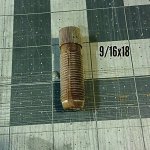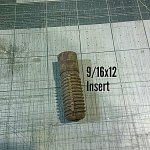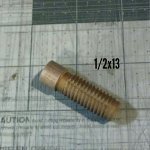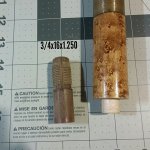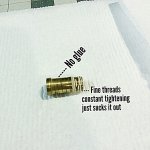If your tools are sharp, it shouldn't present a problem.Can I use ebony to plug and build up.(I have small piece)...or will I regret it when drilling/tapping?
You are using an out of date browser. It may not display this or other websites correctly.
You should upgrade or use an alternative browser.
You should upgrade or use an alternative browser.
Fix or toss
- Thread starter GoldCrown
- Start date
Thank you...If your tools are sharp, it shouldn't present a problem.
Wouldn't be my first choice. This is a high stress area.Can I use ebony to plug and build up.(I have small piece)...or will I regret it when drilling/tapping?
Make sure your plug goes deep eneogh and use good epoxy, especially if your plug isn't threaded.
Most of you have probably heard this; amateurs practice till they finally get it right, a pro practices till they never get it wrong. This applies to most everything in life.Good call. I'm a fan of the "repetition, repetition, repetition" philosophy, keep doing it over and over until you can teach it - only then have you mastered it.
Please suggest. That’s why I’m asking. I’m more concerned with technique but want to produce a playable shaft.Wouldn't be my first choice. This is a high stress area.
Make sure your plug goes deep eneogh and use good epoxy, especially if your plug isn't threaded.
I’m not 50% into this and learned things. I enjoy the process … execute - observe - adjust.Most of you have probably heard this; amateurs practice till they finally get it right, a pro practices till they never get it wrong. This applies to most everything in life.
Ebony is hard but hard isnt always a great choice because the harder it is, the easier it can crack.Please suggest. That’s why I’m asking. I’m more concerned with technique but want to produce a playable shaft.
Take phenolic for example. I love the stuff but I like rolled and molded. Its tight grained and strong but the black for some reason is harder than the brown and cracks easier when tapping. If you don't live thread, invest in some split dies and taps of popular sizes for plugs. it's not a waste of money. For a plug in the area of the joint on a shaft, I suggest at least 2 inches deep. (stress area)
I don't use 5 You minute epoxy. My shop my rules
When it comes to any glue/epoxy. Learn about it!
If your going to get into this, start right, right from the start so the end result will last! You and only you control what your doing.
Have fun!!!
Attachments
2” deep… understood. Skip 5 min epoxy. This shaft has some kind of black plastic like material in the core. I have a tap for 5/16-14 & UniLoc. Made joint protectors. For now want a tap for 5/16-18 pin and tap for the 5/16-18 OD insert. No idea what tap to use for the insert.Ebony is hard but hard isnt always a great choice because the harder it is, the easier it can crack.
Take phenolic for example. I love the stuff but I like rolled and molded. Its tight grained and strong but the black for some reason is harder than the brown and cracks easier when tapping. If you don't live thread, invest in some split dies and taps of popular sizes for plugs. it's not a waste of money. For a plug in the area of the joint on a shaft, I suggest at least 2 inches deep. (stress area)
I don't use 5 You minute epoxy. My shop my rules
When it comes to any glue/epoxy. Learn about it!
If your going to get into this, start right, right from the start so the end result will last! You and only you control what your doing.
Have fun!!!
I’m only involved with tips/cleaning, JP’s. The shaft repair is a first. This is all for hobby. I do whatever I can for friends. I don’t accept any $$.
I’ll take suggestions for a tap set that covers most pins/inserts
They sell 2 different kind of inserts. One is better if you have a boring bar because of the barrel. The other is threaded 7/16x14. I like boring everything but you may not be ready to invest everything yet. You will in time.2” deep… understood. Skip 5 min epoxy. This shaft has some kind of black plastic like material in the core. I have a tap for 5/16-14 & UniLoc. Made joint protectors. For now want a tap for 5/16-18 pin and tap for the 5/16-18 OD insert. No idea what tap to use for the insert.
I’m only involved with tips/cleaning, JP’s. The shaft repair is a first. This is all for hobby. I do whatever I can for friends. I don’t accept any $$.
I’ll take suggestions for a tap set that covers most pins/inserts
Attachments
Ordered a few threaded from Schmelke.They sell 2 different kind of inserts. One is better if you have a boring bar because of the barrel. The other is threaded 7/16x14. I like boring everything but you may not be ready to invest everything yet. You will in time.
I spent many years in the aerospace industry machining aircraft structural parts. You'd be surprised how much phenolic is, or was, used in aircraft, but at any rate I learned there were basically 2 kinds of phenolic back then. One was paper based and the other was cloth based, so I'd imagine the big difference in phenolic strength would have something to do with that,,,,,,,, cloth obviously being the strongest.Ebony is hard but hard isnt always a great choice because the harder it is, the easier it can crack.
Take phenolic for example. I love the stuff but I like rolled and molded. Its tight grained and strong but the black for some reason is harder than the brown and cracks easier when tapping. If you don't live thread, invest in some split dies and taps of popular sizes for plugs. it's not a waste of money. For a plug in the area of the joint on a shaft, I suggest at least 2 inches deep. (stress area)
I don't use 5 You minute epoxy. My shop my rules
When it comes to any glue/epoxy. Learn about it!
If your going to get into this, start right, right from the start so the end result will last! You and only you control what your doing.
Have fun!!!
Rule of thumb.I spent many years in the aerospace industry machining aircraft structural parts. You'd be surprised how much phenolic is, or was, used in aircraft, but at any rate I learned there were basically 2 kinds of phenolic back then. One was paper based and the other was cloth based, so I'd imagine the big difference in phenolic strength would have something to do with that,,,,,,,, cloth obviously being the strongest.
When ordering phenolic. Ask for rolled and molded.
If they say HUH??
Your shopping at the wrong place!
I'm enjoying the education here gentlemen, thanks 
Here's a quick read I found regarding phenolics:
 www.emcoplastics.com
www.emcoplastics.com
Here's a quick read I found regarding phenolics:
Phenolic Sheets & Rods | Emco Industrial Plastics
Phenolic is available from Emco plastics in a variety of grades and dimensions, with the ability to custom machine & fabricate it as well. Call today!
Great.Ordered a few threaded from Schmelke.
Now..........drum role Please
Next pictures from you should be a finished product.
Show us Please!
Next picture will be a finished item. And I’m ok with errors on this one..we grow from there. Thanks all. You guys rock.Great.
Now..........drum role Please
Next pictures from you should be a finished product.
Show us Please!
Is this want I want/need?

 www.cuestik.com
www.cuestik.com

Linen - Rolled & Molded
Phenolic rods are a hard, dense material made by applying heat and pressure to fiber or fabric and applying a synthetic resin. Phenolics are some of the best-known general purpose thermoset resins. It is lightweight, about half the weight of aluminum, and hasan unusual combination of desirable...
Chucking with a piece of leather instead of a collet. Is this something experienced cue makers do...is it a preferred or non preferred technique? I like the concept. I realize there is no substitute for trying/doing...but I do not feel like experimenting. Yay or nay.
Last edited:
No dial at this stage. Reason I'm asking about the leather... I had a shaft spin and scuff the finish. Not big deal but would like to avoid that.If it holds it securely and more importantly, accurately it would be ok. I don't think I would trust a natural material like that to have enough uniformity of thickness and density. Do you have a dial indicator to see if your work is running true?
